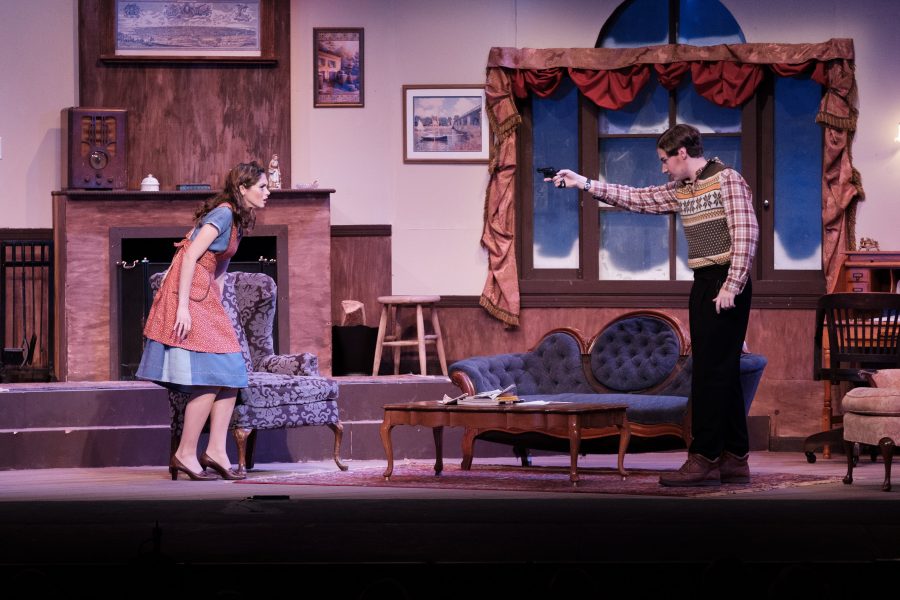With an unexpected series of events and eccentric characters, it is no surprise that The Mousetrap has been showing in London’s St. Martin’s Theatre for 67 years since its opening—the longest initial run of any play in history. Theatre Ink’s recent performance exemplified the thrilling nature and lasting legacy of this show.
The Mousetrap, written by Agatha Christie, ran Oct. 31 to Nov. 2 at 7:30 pm in the auditorium. Seniors Noah Leikind and Lonnie Miller directed the timeless production.
The play is set in an ancient British mansion, Monkswell Manor, on a cold winter day. Decorated meticulously with vintage paintings and household appliances, the set looked exactly like a 20th century estate.
One of the unique aspects of the show is that it is up to the audience themselves to deduce who the murderer is. “You’ll have fun trying to figure out who’s the murderer by just looking at all the different characters. It’s the appeal of Agatha Christie: that classic who done it, you know?” said junior Jacob Silberman-Baron, who played Major Metcalf.
The radio in the background even functions to introduce the plot by broadcasting a recent murder. A young couple, Mollie and Giles Ralston, played by seniors Amanda Redmond and Teddy Walsh, arrive at the manor, discussing their decision to convert it into a guesthouse.
Almost immediately, the play gives the audience a reason to be suspicious. When the radio is describing the murderer as wearing a trenchcoat and scarf, the audience couldn’t help but notice that Giles was wearing the exact same thing as Mollie is putting his clothes away.
One by one, a cast of eccentric guests begin to arrive at the mansion. The actors and script highlighted the strong and unique personalities of each character. For example, sophomore Tal Pemstein, who plays a flighty young man named Christopher Wren, spoke in a jittery, lilted voice. Meanwhile, junior Chika Udemagwuna criticized the hosts and other guests in a posh British accent as a pompous old woman named Mrs. Boyle.
Silberman-Baron said, “One thing that [Theatre Ink director Adam] Brown was kind of talking about is that the characters are still fun no matter how many times you see it. He directed the play 30 years ago, and he still likes these moments.”
The actors’ hair and makeup were expertly done, and their costumes and acting were exactly like their 20th century counterparts, down to their polished English accents. According to Silberman-Baron, the cast had an accent coach for “about once a week for 30 minutes” that helped them get into character.
The next morning, Mollie receives a phone call from the police explaining that police are being dispatched to the guest house. Later, Sergeant Trotter, played by senior Alex Wymer, appears at the door of the house in skis. He elaborates on the murder that was introduced in the first scene, claiming that the killer was in the house and that one of the guests or the couple could likely be the next victim.
Quickly, things take a sour turn as the guests and the couple realize that the phone lines were cut, and that they are trapped in the house with a murderer and no way to contact the outside world.
Everyone begins accusing each other of being connected to the crime. Even Mollie and Giles begin arguing frequently and distrusting each other. While Mollie believes the Sergeant, Giles is very skeptical of his motives. Walsh described his character, Giles, as a prideful person. “It’s hard for him to imagine someone not believing that he’s right,” he said.
Right before the intermission, the play leaves the audience at a cliffhanger as Mrs. Boyle is shown to be strangled.
This only worsens the situation at hand. Mollie grows increasingly panicked, which affects her relationship with Giles. The rest of the characters become even more suspicious of one another. According to Walsh, “There’s a wide array of characters that can reflect different aspects of people. Seeing how they react and what the pressure does to them is really interesting and entertaining.”
However, even with the intense situation, the play was still peppered with moments of comic relief and funny dialogue. Some of them were even unintentional. For example, Metcalf was not meant to have an amusing role, but the way Silberman-Baron delivered his punchlines made for a very entertaining character.
According to Walsh, “After we went through it like a million times in rehearsal, the humor of it fades out of our minds. The audience laughed at a lot at things that I personally didn’t expect them to.”
Eventually, the murderer is revealed in a twist ending to be Trotter himself when he confronts Mollie with a pistol. One of the main themes of the play is that “things aren’t always as they seem,” said Silberman-Baron. “You have a bunch of characters who seem really suspicious, and they’re the ones who ultimately had nothing to do with it. It turns out to be the one you least expect.”
The show ends with a few other reveals. Miss Casewell, played by junior Ari Zalis, is actually Trotter’s long lost sister, and Metcalf was the real dispatched policeman. The excellent acting and characterization, spectacular set, and detailed costumes were met with thunderous applause, putting a successful end to Theatre Ink’s second show of the season.
“Even if you know who the murderer is, even if you know the twist ending,” said Silberman-Baron. “There’s just something about seeing it that makes it a fun ride.”









































